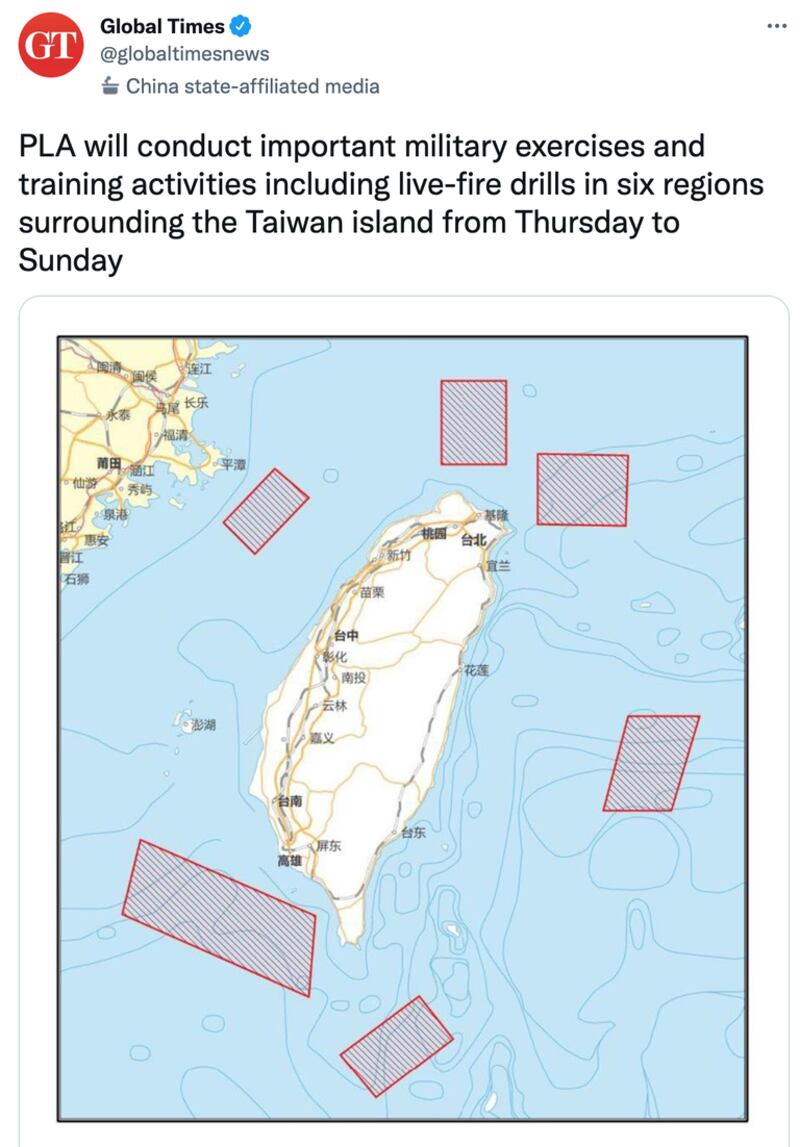Updated at 1:08 p.m. EDT on 2022-08-03
U.S. House Speaker Nancy Pelosi departed Taiwan Wednesday after meeting its president and praising the democratic island’s “resilience” as China voiced anger and state media trumpeted an unprecedented missile barrage and blockade.
Taiwan President Tsai Ing-wen presented Pelosi with a special award on Wednesday, calling her “one of Taiwan’s most devoted friends” who helped strengthen Taiwan-U.S. relations.
Tsai met Pelosi in the morning after the U.S. House Speaker visited the Legislative Yuan, or Taiwan’s parliament. Pelosi praised the island for its success in battling the COVID pandemic and called Taiwan “one of the freest societies in the world.”
“Taiwan has been an island of resilience,” Pelosi said in a brief speech during her meeting with President Tsai.
“America’s determination to preserve democracy here in Taiwan and around the world remains ironclad,” the U.S. House Speaker stated, adding that her visit made it unequivocally clear that the U.S. “will not abandon our commitment to Taiwan.”
In response, Tsai said Taiwan “will firmly uphold our nation’s sovereignty and continue to hold the line of defense for democracy.”
“Facing deliberately heightened military threats, Taiwan will not back down,” Tsai said, referring to the latest developments across the Taiwan Strait.

Military police officers get into position for a drill on how to guide citizens to safety in the event of an attack, in Taipei, July 22, 2022. [Ann Wang/REUTERS]
A new crisis?
Beijing considers Taiwan “an inalienable part of China” that must be reunited with the mainland at all costs.
Analysts say, however, despite the noisy saber-rattling by Beijing, a new crisis may not happen as “nobody wants war.”
“While China has said Pelosi’s visit would challenge its ‘red line’ for Sino-U.S. relations, it’s unlikely that Beijing will do something risky in the Taiwan Strait during her visit,” said Baohui Zhang, Professor of Political Science at Lingnan University in Hong Kong.
“Beijing has no interest in triggering scenarios that may lead to miscalculations by all sides and inadvertent military conflicts,” Zhang said, adding: “As a rising power, war is the last thing China wants now.”
During the most recent virtual meeting between Xi and Biden, the two leaders both confirmed the need for bilateral efforts to contain and manage crises.
In Zhang’s opinion, Pelosi’s visit will have little practical implications for U.S.-China relations, as its trajectory of strategic rivalry has already been set.
The Taipei-based China Times cited leaked diplomatic cables from Taiwan’s representative office in Washington, saying they showed both the White House and the Pentagon sought to discourage the House Speaker from visiting Taiwan.
“The Biden administration is not in favor of the visit and China knows that,” said Baohui Zhang.
“So the visit is largely a symbolic event showing rising Congressional support for Taiwan. It will not redefine U.S.-China relations.”
This report was produced by Radio Free Asia (RFA), an online news service affiliated with BenarNews, and with contributions from BenarNews staff in Manila and Jakarta.
